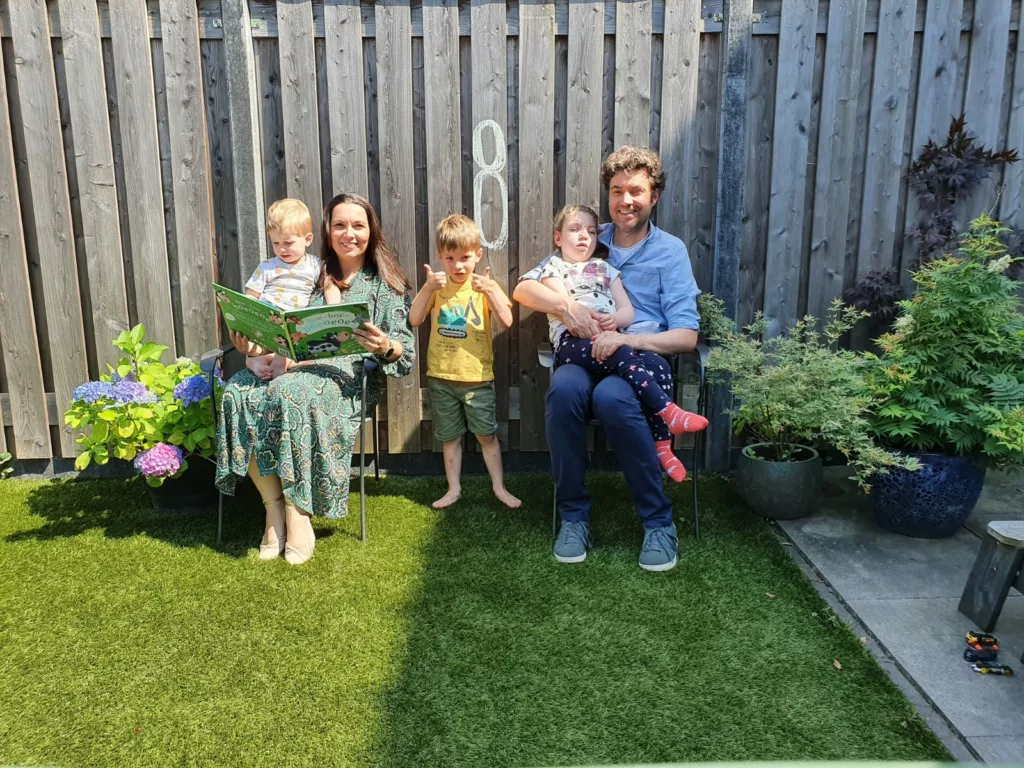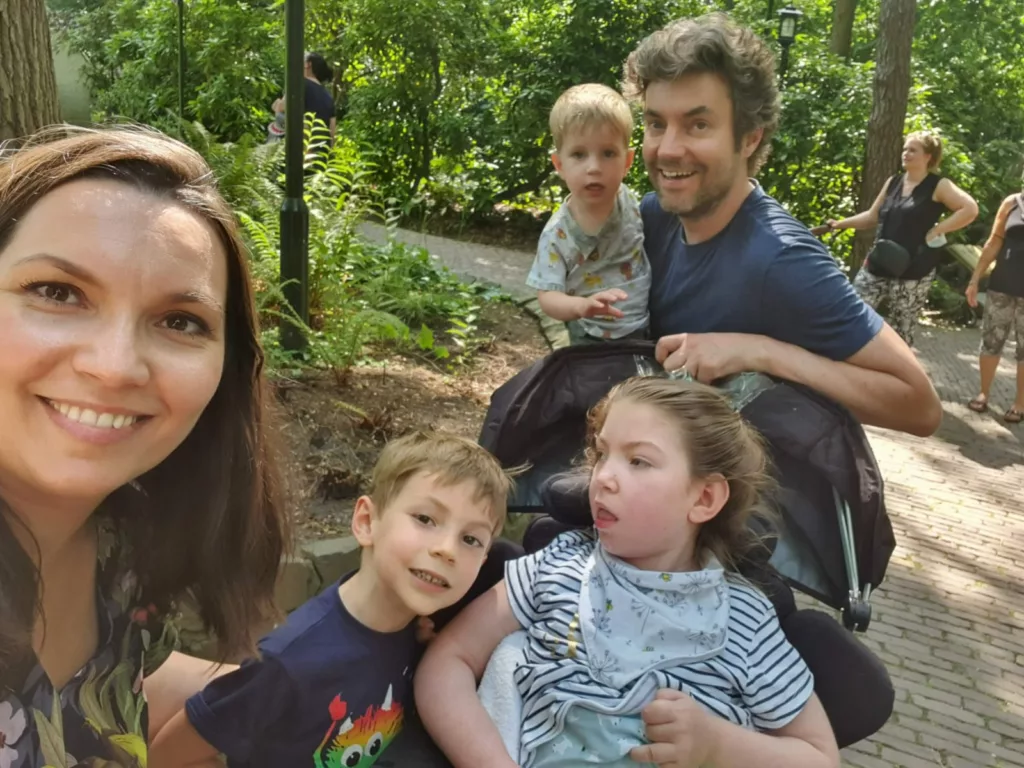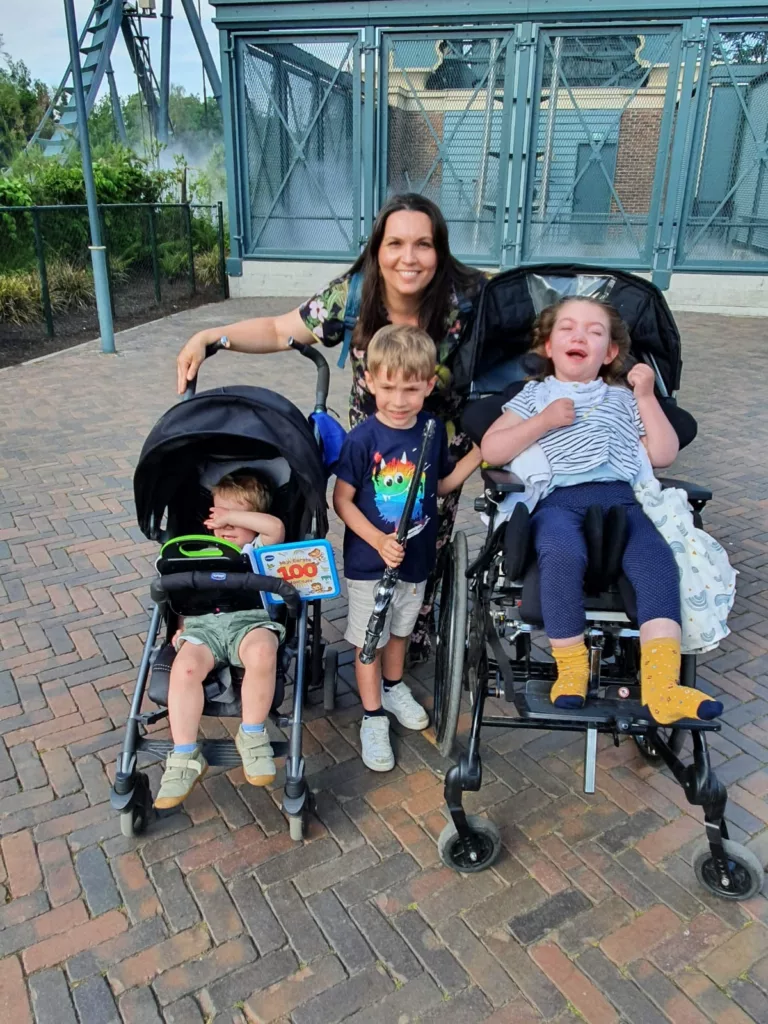1. First, tell us a little about yourself. Who is Silvia Mihaila?
Hi, my name is Silvia Mihăilă, a passionate researcher and dedicated mother. In 2017 I started a new phase in my career as a postdoctoral researcher at Utrecht University, and since 2021, I have become an assistant professor, focusing on in vitro models in pharmacology research. Together with my husband - Dennis - and three wonderful children, Amy (8), Noah (7) and Jason, we live in Nijmegen, the Netherlands.
2. What brought you to tulip country?
My story in the Netherlands started as an academic adventure in Portugal during an Erasmus scholarship. In my last year of university (physics-chemistry) I went on a scholarship to Coimbra. I loved it so much that after finishing my studies in Romania, I decided to continue my research journey in this beautiful country by enrolling for a PhD. During my PhD, I met Dennis, a Dutchman, who became my husband. After completing the project in Portugal, Dennis returned to the Netherlands and I followed him.

3. We all know that one of the biggest challenges for expats is looking after children when the family is far away. I imagine for a mother of a disabled child the challenges are even greater. What does a day in your life look like? Tell us briefly what a day in your life looks like.
In our journey as a family, we face the challenges of caring for a child with special needs, and the distance from other family members adds another dimension to this journey. In our case, the story begins with a burst of excitement - joy was accompanied by fear when we found out we were having identical twins, but the news of losing one of them, Chloe, and Amy's massive stroke at 20 weeks completely changed our perspective on life. The first two years of little Amy's life were spent at home, in a small hospital set up in our own home. In the meantime, Noah, our first baby boy, came into the family. With specialists on our doorstep daily and constant deliveries of equipment and supplies, we dedicated ourselves to her complex care. Faced with huge challenges, the medical team suggested the option of a specialist centre, at which point we felt a deep dilemma between wanting to give her the best and fearing to separate her from us. But visiting the centre and getting to know the team, we discovered an environment tailored to Amy's special needs, where therapies are accessible at all times and the medical staff are specialists. The difficult decision to transfer her turned into a wise choice for Amy, providing her with a safe haven and tailored support. Despite the challenges, Amy is our source of joy, light and peace.
Although my family is in Romania, my family in the Netherlands is close to us, especially my paternal grandparents, who are an invaluable support. Every Wednesday, they visit her with love at the specialist centre. As her first granddaughter, the special bond is reflected in a special love. Actively involved in her care and in the centre's activities, the grandparents are present and reliable supporters. With their deep commitment, they bring a touch of warmth and confidence to our lives. Their essential presence assures us that Amy has a strong network of love and support on this complex journey.
Also, knowing the medical conditions in Romania, we don't feel safe bringing Amy to Romania. In addition, we note that some, perhaps influenced by their own experiences, feel that Amy would be a burden to us. However, we want to strongly emphasise the opposite. Amy is not a burden for us, but she is our joy, light and peace in our lives. We are the proudest parents and Amy brings a wealth of love and understanding to our family. Even though the challenges are real, every day spent with Amy is a victory and a blessing. Our love for her gives us the strength to overcome any obstacle and see the light in the midst of darkness.
4. What does a relaxing day with your family look like for you?
Our weekends are mostly dedicated to relaxing moments at home, avoiding crowded places due to complex logistics. But on nice days, we prefer walks in the woods or park. The importance of spending time with Amy's younger siblings is obvious, and we actively involve them in her daily activities. A few years ago, we had the privilege of being invited for a week at Villa Pardoes in Efteling. Each day was full of Amy-friendly activities and the accommodation was truly extraordinary. These getaways bring us joy and create precious memories for the whole family.

5. Do you receive any support from the Dutch state for Amy's care?
Amy receives considerable support from the Dutch state for her special needs. The costs associated with her care are covered by insurance, including accommodation, therapies (speech therapy, physiotherapy, music therapy), medical consultations, medication, nappies and daily care services. At the care centre, Amy has a dedicated caregiver to meet her needs. At times of routine check-ups or spontaneous admissions, especially in the cold winter months when Amy can get sick like other children, we intervene quickly. In these situations, caregivers from the center come to the hospital and spend a few hours with Amy, allowing us to take care of household chores and the needs of other family members. It's an efficient and well-coordinated system that ensures Amy is properly cared for in all circumstances.
6. Tell us a bit about your profession. What do you do? Have you had to change careers all these years since you have been living in the Netherlands? Has it been difficult? Have you had any difficulties with the language?
As for my profession, I have been involved in research from the time I graduated until today. Both my husband and I had full-time jobs when Amy came into the world. Of course, there was pressure for one of us to give up our jobs to devote ourselves to Amy's care. However, we received considerable support from our employers and for a time we were able to work part-time. With a well-established routine in place, now that Amy is at the centre during the week, we have returned to full-time jobs. In terms of language, in the academic and international environment in which we work, English is the main language of communication.
7. How is the community you live in, did you feel welcome in the West?
I can see many positive aspects of life in the Netherlands. However, despite my 10 years here, I still don't feel fully integrated into the local community. I prefer to build connections among expat communities, where I can more easily share experiences and concerns about life outside my home country. We are not members of any community dedicated to families with children with disabilities, choosing to live quietly, let's say in a bubble of our own. That's why it's sometimes difficult for us to open up and talk about the challenges we face. Maybe it's also because, to us, Amy is just a child like any other, and we want to give her a happy life.
8. If you were to draw a parallel between Romania and the Kingdom of the Netherlands, what differences do you see in economic, social and cultural terms?
Comparing Romania and the Kingdom of the Netherlands, there are notable differences in various areas. From an economic point of view, the Netherlands is characterised by stability and substantial financial support for families with special needs, whereas in Romania access to such resources may be more limited. Socially, in the Netherlands there is a mentality focused on community support and inclusiveness, whereas in Romania, families may feel more pressure and less institutional support. Culturally, values and approaches may vary, with the Netherlands having a history of tolerance and openness and Romania often retaining conservative traditions and values. We also noticed that the logistics of cities in the Netherlands are stroller-friendly, facilitating access and mobility for families with children with disabilities. We found that in the Netherlands, a child with a disability is considered as valuable as a typical child, and Dutch society is deeply involved and eager to provide support. There are many foundations that organise special events for children with disabilities and they are well represented in decision-making and civil forums. This underlines the Dutch commitment to integrate people with special needs into society and to support them, in marked contrast to some realities in Romania.
9. One last question, since you have been living in the West for some time: do you have any advice for (Romanian) parents who have children with disabilities and are thinking of emigrating?
- Investigate the health and education system: before making a decision, carefully research the health and education system in the country you are considering emigrating to. Make sure there are adequate facilities and resources for the care and development of children with disabilities.
- Connect with the local community or communities dedicated to children with special needs: integration into a local community is essential. Seek out support groups for parents of children with disabilities, attend community events and connect with other parents who have gone through similar experiences. Emotional and informational support can make a significant difference.
- Know your rights and available resources: Each country has different laws and resources for people with disabilities. Investigate the rights and benefits available to children with special needs in your new country of residence. It is important to know what support the state can offer you.
- Think about the quality of family life: consider how the decision to emigrate will affect the quality of life of the whole family. Consider issues such as access to healthcare, quality education, social opportunities for children and community support.
- Plan financially: establish a sound financial plan. Expenditure on caring for children with disabilities can vary significantly between countries. Make sure you are financially prepared for the costs involved and have access to financial support programmes.
- Be open to change: emigration brings with it major changes in family life. Be open to adaptation and prepare to face new challenges. Open communication and flexibility will play a crucial role in this transition.
- Seek professional help: consult experts in the field of social, educational and medical services in the destination country. They can give you valuable advice and information to help you make informed decisions.
After all, every situation is unique, and the decision to emigrate should be carefully considered and taken into account according to your child's specific needs. I wish you much wisdom and support on this journey!

Interview by Magda Mincu.
Magda has been living in the Netherlands since 2012 with her family. She is a translator by profession (predominantly from Dutch into Romanian) and has been part of the marketing team of the Rompro Foundation since early 2022. She chose to become a volunteer in the Foundation primarily out of a desire to socialize with other Romanians living in the Netherlands, but also to help with information and translations.
